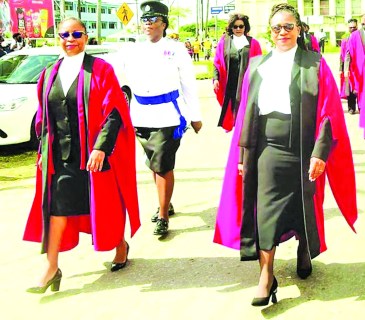…says political cases overturned by CCJ have no impact on appointments
President Irfaan Ali has clarified that the overturning of political cases by the Caribbean Court of Justice (CCJ) especially those from the Court of Appeal, has no bearing on the appointment of the acting Chief Justice Roxane George, SC and acting Chancellor of the Judiciary, Justice Yonette Cummings-Edwards.
Answering a question asked about concerns raised on the issue, during his end of Year press conference on Tuesday, President Ali emphasised the independence of the Judiciary and the processes in place for judicial review and accountability.
The President acknowledged that several cases decided by the local Appeal Court were overturned by the CCJ, but he stressed this as a natural course of judicial procedure. “That is why you have superior courts,” he stated, underscoring the importance of an independent Judiciary system where decisions are tested at various levels.

The Guyanese Leader elaborated on the functioning of the Judiciary, noting that the system allows for decisions from the High Court and the Appeal Court to be examined and ruled upon by higher courts. He pointed out instances where the CCJ upheld High Court rulings, while also overturning others from the Appeal Court.
“This has no impact on our decision-making as a Government. It speaks to the judicial process itself and what happens at the front level of the Judiciary. And that is why the Judiciary is made up of superior courts, so that decisions can be tested,” he explained.
He urged the Judiciary to continuously analyse the reasons behind any high rate of overturned decisions to maintain its credibility and uphold public confidence.
The President also highlighted progress within the Judiciary, such as improved case clearance rates, demonstrating that the system is evolving positively.
Meanwhile, responding to concerns about the acting roles of the current Chancellor and Chief Justice, President Ali acknowledged the situation but affirmed that efforts are underway to address it. “We do have a Chancellor and Chief Justice acting, just as we had an acting Commissioner of Police before his recent confirmation…So, as President, the issue of the Chancellor and Chief Justice is one that is being continuously looked at,” he said.
The Head of State emphasised that the appointment process for these crucial positions requires careful consideration and adherence to established procedures. “As President, I will follow the process, all the circumstances that exist to ensure that we have the Chancellor and Chief Justice that would continue to take the Judiciary into a place that all of us will be proud of. All of the region will be proud of.”

President Ali reiterated his commitment to resolving the issue of acting appointments in the Judiciary. While he did not provide a specific timeline, he assured that the matter remains a priority for his administration.
The last substantive appointments for Chancellor of the Judiciary and Chief Justice occurred during the late 1990s. Justice Désirée Bernard served as the first female Chancellor of the Judiciary from 2001 to 2005 before her elevation to the CCJ.
The Constitution mandates that the President and the Leader of the Opposition must agree on the appointments of the Chancellor and Chief Justice. However, political divisions have repeatedly stalled this process, leaving the positions to be filled in an acting capacity for over two decades.
Justice Yonette Cummings-Edwards has been serving as acting Chancellor since 2017, while Justice Roxane George was appointed acting Chief Justice in the same year. Calls for substantive appointments have been a recurring demand from legal professionals, civil society groups, and international organisations, who argue that the long-standing acting appointments undermine the stability and perception of the Judiciary’s independence.
Efforts to resolve the impasse have been sporadic, with varying degrees of progress made under different administrations. President Ali’s recent remarks signal continued recognition of the issue, though concrete resolutions remain pending. (G1)
Discover more from Guyana Times
Subscribe to get the latest posts sent to your email.













